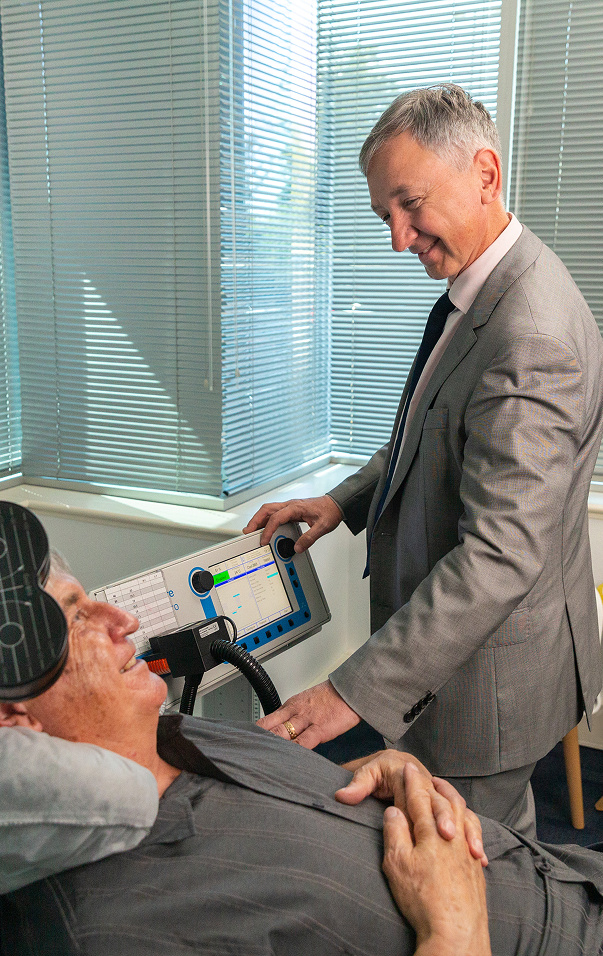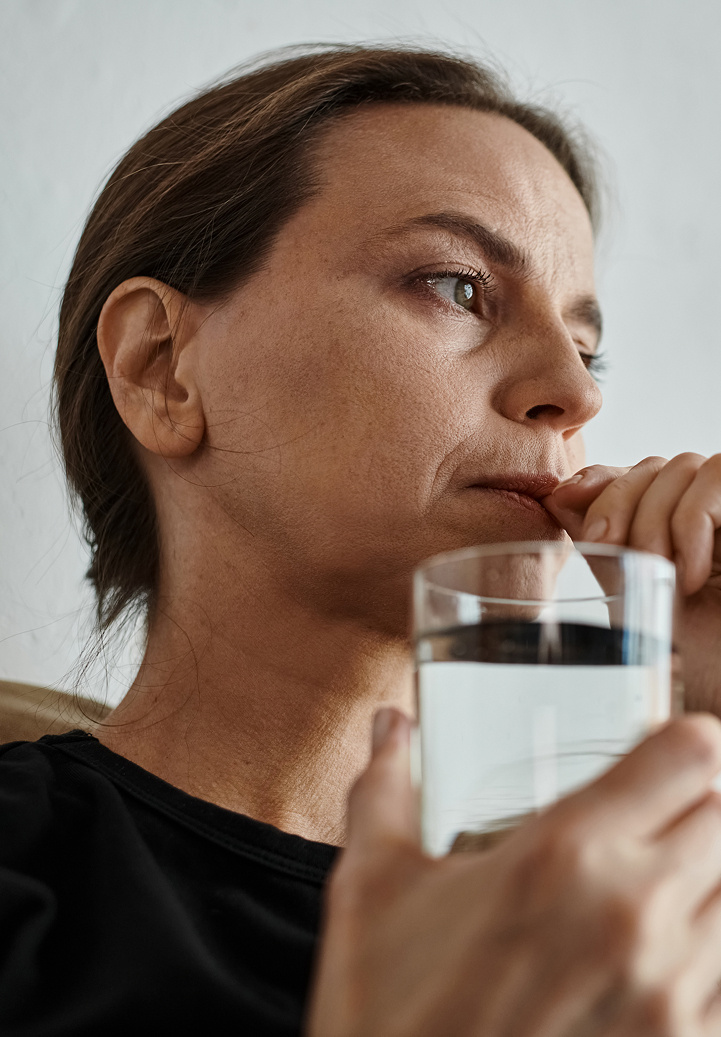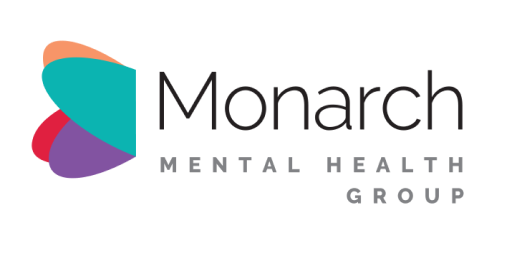When Trauma Follows You Home: Innovative PTSD Treatment for Those Who've Served and Protected
Non-invasive TMS therapy targets the root cause of PTSD with no medication side effects and over 50% success rate.
Break Free from PTSD: Advanced Treatment for Veterans, First Responders, and Workplace Trauma Survivors
TMS offers a breakthrough approach by directly targeting the brain regions affected by trauma. Unlike medications, TMS uses precise magnetic pulses to rebalance neural activity in areas controlling stress and emotional responses. These painless 30-minute sessions require no sedation or downtime, fitting seamlessly into your busy schedule.
Over 50% of our patients experience significant reduction in PTSD symptoms, even when other treatments have failed. Many report feeling calmer, with fewer flashbacks and better sleep. Imagine engaging with loved ones without feeling on edge and finally reclaiming the life you deserve after serving others.
How Can TMS Treat PTSD?
Post traumatic stress disorder often results from traumatic experiences or traumatic memories that disrupt normal brain function, leading to heightened stress responses, flashbacks, and emotional dysregulation. Research shows that TMS therapy directly addresses these issues by:

Stimulating Underactive Brain Areas
Transcranial Magnetic Stimulation targets areas of the brain that are less active in individuals with PTSD, improving communication between neural pathways involved in mood regulation.

Rewiring Emotional Processing
By enhancing neuroplasticity, TMS helps the brain form healthier connections, reducing the intensity of PTSD symptoms like anxiety, hypervigilance, and intrusive memories. It is also effective for depressive symptoms that often accompany PTSD.

Promoting Long-Term Healing
Regular TMS sessions encourage sustained improvements in brain activity, offering lasting relief even after the treatment
course ends.
Benefits of TMS Therapy for PTSD Patients
TMS therapy offers a range of benefits that make it an appealing option for PTSD treatment and other mental health issues like anxiety disorders and major depressive disorder:
 Non-Invasive and Painless
Non-Invasive and Painless
There are no needles, anesthesia, or recovery periods involved and treatment is completely pain-free. Highly Effective
Highly Effective
TMS has shown significant success in reducing PTSD symptoms and depressive symptoms, even in treatment-resistant cases. Minimal Side Effects
Minimal Side Effects
Unlike many medications and antidepressants, TMS avoids systemic side effects such as fatigue, weight changes, or dependency. Convenient PTSD Treatment
Convenient PTSD Treatment
Sessions are brief—usually 20-40 minutes—and fit easily into your daily schedule. Personalised Care
Personalised Care
At MMHG, we tailor each treatment plan to your unique needs for optimal outcomes.



Are There Side Effects to TMS Treatment?
TMS is widely regarded as a safe and low-risk treatment for PTSD. Most patients experience only mild and temporary side effects, such as:
- Slight scalp sensitivity or discomfort during treatment.
- Mild headaches that usually resolve quickly.
- Fatigue.
At Monarch Mental Health Group, your comfort and safety are our top priorities. Our experienced clinical teams ensure every PTSD treatment session is conducted with care and precision to minimise any potential side effects.
Is TMS Effective at Treating PTSD Symptoms?
Clinical research highlights TMS as an effective treatment for PTSD, particularly in cases where other interventions have failed. Studies show that:
- Over 50% of patients with post traumatic stress disorder from a traumatic event or traumatic memories experience significant symptom reduction.
- Many achieve sustained improvement in anxiety, sleep disturbances, and emotional stability.
At Monarch Mental Health Group, we’ve seen transformative results, helping patients regain control of their lives and find relief from the debilitating effects of PTSD symptoms.
The TMS Treatment Process
Initial Consultation
Customised Treatment Plan
TMS Sessions
Progress Monitoring
Ongoing Support
TMS Therapy: A Safe and Effective Option
TMS is a non-invasive procedure that uses magnetic pulses to stimulate specific areas of the brain, promoting positive mood changes and helping to treat depression. It is recommended for treatment-resistant cases of all forms of depression, including mild or moderate depression and severe depression. Dr. Ted Cassidy, a Monarch psychiatrist, is a leading mental health professional and expert in TMS therapy.
There are two types of TMS therapy used to treat depression - Repetitive Transcranial Magnetic Stimulation (rTMS) and Transcranial Direct Current Stimulation (tDCS).
While both rTMS and tDCS are non-invasive brain stimulation techniques for depression and major depressive disorder, they differ significantly. rTMS uses brief, rapidly pulsing magnetic fields to target specific brain regions. These pulses can either excite or inhibit neural activity, depending on the stimulation pattern. In contrast, tDCS uses weak electrical currents delivered through scalp electrodes to modulate brain activity in a targeted area. tDCS is thought to primarily increase or decrease the excitability of neurons, with less precise control than rTMS. Consulting a healthcare professional can help determine which approach might be right for you.
Frequently Asked Questions
Transcranial Magnetic Stimulation (TMS) or repetitive TMS (rTMS) is a non-invasive therapy for post traumatic stress disorder that uses magnetic pulses to target brain areas responsible for mood and stress regulation. It stimulates underactive neural pathways, helping to reduce PTSD symptoms like anxiety, flashbacks, and emotional instability. By enhancing brain connectivity, TMS treatment promotes healing and emotional balance, as well as relief from depressive symptoms. It’s a safe, effective option for treating PTSD and other mental health conditions for individuals who haven’t found relief with medications or traditional therapies, offering hope for lasting symptom reduction and improved quality of life. To find out more about the effectiveness of TMS, contact our clinics conveniently located in New South Wales, Victoria, and Queensland.
A standard TMS treatment course for post traumatic stress disorder involves 35 sessions over 4-6 weeks, with each session lasting 20-40 minutes. These sessions are quick and require no recovery time, so you can resume daily activities immediately afterward. While the full treatment duration depends on individual needs, most patients begin to notice symptom improvements within a few weeks. At Monarch Mental Health Group, a leading group of mental health clinics in Queensland, Victoria, and New South Wales, we monitor your progress throughout the Transcranial Magnetic Stimulation course to ensure the best possible outcomes for your mental health.
TMS is FDA approved for treatments of depression and OCD, and has shown great benefit to individuals who have been diagnosed with PTSD. Common side effects include mild scalp discomfort or headaches during the first few sessions, which typically subside quickly. Unlike medications, Transcranial Magnetic Stimulation does not have systemic side effects like weight gain or sexual problems. At Monarch Mental Health Group, our experienced clinicians prioritise your safety and comfort, ensuring that each session is carefully administered and tailored to your needs.
TMS treatment is effective for many individuals with post traumatic stress disorder from a traumatic event or traumatic memories, particularly those who haven’t responded to traditional treatments. However, results vary depending on factors like the severity of symptoms and individual brain activity. While not a universal solution, Transcranial Magnetic Stimulation offers significant symptom relief for most patients, including relief from depressive symptoms. During your consultation at Monarch Mental Health Group with a mental health professional, we will evaluate your condition and customise a treatment plan to maximise its effectiveness and determine if TMS is the right fit for you.
Insurance coverage for TMS for PTSD patients varies based on your specific policy. To claim Medicare rebates, you’ll need a referral from your GP or psychiatrist, along with a current Mental Health Care Plan. Our team at Monarch Mental Health Group can help you navigate the process and explore your coverage options. We recommend contacting your insurer for detailed information about your benefits, ensuring you can make the most of Transcranial Magnetic Stimulation treatment for PTSD without unnecessary financial stress.
Our Locations and Contact
Castle Hill
Suite 21, Barwell Centre, 7-9 Barwell Avenue, Castle Hill, NSW 2154
Phone: +61 1300 867 888
Fax: +61 1300 867 889
Wagga Wagga
19 Morshead St, Ashmont, Wagga Wagga NSW 2650
Phone: +61 1300 867 888
Fax: +61 1300 867 889
Fortitude Valley
438 St Pauls Terrace, Fortitude Valley, QLD 4006
Phone: +61 1300 867 888
Fax: +61 1300 867 889
Sunshine Coast
Suite 2/20 Ormuz Ave, Caloundra, QLD 4551
Phone: +61 1300 867 888
Fax: +61 1300 867 889
Bowen Hills
Banyans Medical Centre, 16 Thompson St, Bowen Hills, QLD 4006
Phone: +61 1300 867 888
Fax: +61 1300 867 889
Melbourne CBD
Suite 1, Level 4, 20 Collins Street, Melbourne, VIC 3000
Phone: +61 1300 867 888
Fax: +61 1300 867 889
Glen Waverley
426 Springvale road, Glen Waverley, VIC 3150
Phone: +61 1300 867 888
Fax: +61 1300 867 889
Narre Warren
90-92 Victor Crescent, Narre Warren, VIC 3806
Phone: +61 1300 867 888
Fax: +61 1300 867 889

Copyright © 2025 Monarch Mental Health Group ABN 92 612 444 845



